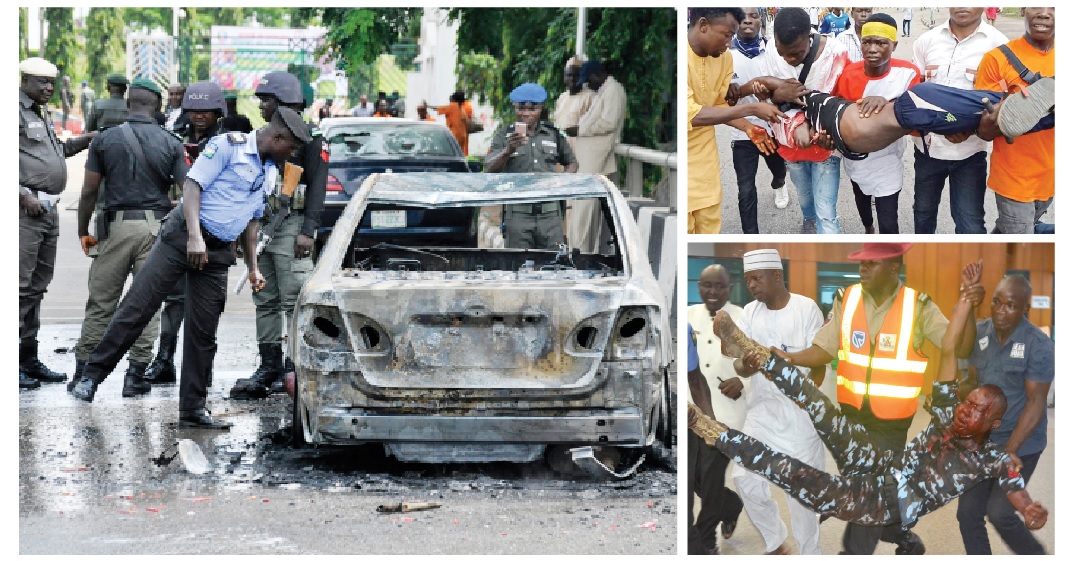Shiites-police clashes too many, too frequent
On August 25, 2024, the Islamic Movement in Nigeria (IMN), popularly called Shiites, clashed with the Police in the Wuse District of the Federal Capital Territory (FCT). The confrontation led to the death of two policemen and a civilian. Several others sustained various degrees of injuries and three police vehicles were burned. The FCT Commissioner […]

Many vehicles were burnt during a protest by members of the Islamic Movement in Nigeria (IMN) at the National Assembly in Abuja yesterday. On the right (top) is an IMN member allegedly shot by the police and (below) a policeman allegedly injured by the protesters.
On August 25, 2024, the Islamic Movement in Nigeria (IMN), popularly called Shiites, clashed with the Police in the Wuse District of the Federal Capital Territory (FCT). The confrontation led to the death of two policemen and a civilian. Several others sustained various degrees of injuries and three police vehicles were burned.
The FCT Commissioner of Police, Benneth Igweh, said the Shiites “have declared total war on us”, adding that, “This is the last protest or procession they will carry out in FCT”.
And this was not the first as the Shiites have a history of clashes with Nigeria’s security forces. On Friday, April 5, 2024, over four people died while 20 sustained various degrees of injuries when they clashed with police operatives during a procession to mark the International Qud’s Day in Kaduna.
On November 17, 2023, two were killed in Kaduna State during their protest condemning the ongoing war in Palestine. Monday, July 22, 2019, at least four people were killed in Abuja following clashes between security forces and members of the group. The dead included a deputy commissioner of police and a journalist with Channels Television.
- Tinubu trying, he inherited near-bankrupt nation – Tafawa-Balewa
- Bauchi: Senator Buba donates to flood victims, asks gov to act
But the bloodiest clash took place on December 12, 2015, in Zaria when a roadblock, which was erected by members of the group, blocked the convoy of then Chief of Army Staff, Lt-Gen Tukur Buratai (rtd). After an “unequivocal” exchange of fire, the convoy passed, leaving in its wake tales of blood. In a follow-up, the army attacked the sect’s mosque and religious centre at the home of the Shiite leader, Sheikh Ibrahim Al Zakzaky, in the Gyellesu neighbourhood and at the sect’s burial ground, Daral-Rahma. There were tens of reported deaths as well as massive arrests, including the group’s leader, Ibrahim El-Zakzaky.
Indeed, the Shia sect has been at odds with Nigerian authorities since the 1980s when its founders led by El-Zakzaky called for the enthronement of an Iranian-style Islamic revolution in Nigeria. It sees secular state as evil and wants an Islamic state based on the Sharia, or Islamic law, rejecting the Nigerian Constitution and encouraging a revolution that focuses on enlightenment.
To contain the group, the federal government went to court and on July 26, 2019, Justice Nkeonye Maha issued the order declaring the IMN and its activities “acts of terrorism and illegality.”
On August 1, 2016, the Kaduna State Government Commission for Judicial Inquiry into the Zaria clashes between IMN and the Army in December 2015 declared that its leader, El-Zakzaky, should be held responsible, for “refusing to call his members to order when required to do so.”
While the panel accused the army of disproportionate use of force contrary to the Army’s own Rules of Engagement and International Standard of Proportionality, it indicted the Shi’ites for consistent unprovoked attacks, illegal occupation of mosques, public and private buildings, and operating in total disregard to constituted authorities, including display of contempt towards Rule of Law and Security Forces.
The panel noted that they illegally mount roadblocks, checkpoints and unjustifiably restrict the movement of innocent citizens, especially during their processions and other activities.
The issue is that these clashes have become too many, and too frequent. We believe that the IMN has taken the liberties too long and too far and the protests have become too provocative. It has operated freely even though it is labelled a terrorist organisation.
Daily Trust believes that Section 38 (1) of the 1999 Constitution provides for freedom of religion but this must be exercised in a lawful and peaceful manner. No Nigerian or group should contravene the law in pursuit of any freedom or to infringe on the rights of others in doing so.
Therefore, no individual or group should operate as if they are above the law as all our activities must be within the borders of Nigerian Law. And the protection of lives and properties of citizens must not be sacrificed under any guise. Indeed, security must be separated from religion or politics.
Therefore, we call on the leadership of the IMN to call their followers to order. They have to be orderly and adhere to laid down rules for the security of everyone along the way.
Moreover, the nation’s security agencies should be proactive and brace up to their responsibilities by supplying actionable intelligence to ensure there is no breakdown of law and order. The 2016 Kaduna panel made this point when it noted that “there was an indication of intelligence failure in the assessment of the threat posed by the Islamic Movement in Nigeria to national security.”
It is time these agencies stop the clashes, after all, no religion sanctions unnecessary loss of lives and properties, all in the name of God. It should be clear that Islam preaches brotherhood and unity, and all Muslims are considered a part of the global Ummah.
